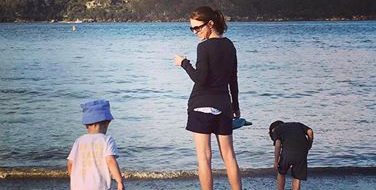This is my favourite time of day.
These waning hours–after sunset and before bedtime (because we are in winter here and the sun goes down hours prior to lights out), during which the four of us are sprawled across two beds, immersed in books or screens or toys, bodies not merely adjacent but connected, crossed over each other, resting upon and underneath each other, because what are boundaries when it’s just us anyway?–these are my favourite. They don’t hold the ensuing obligations of the morning hours, the expectation to fill a day, the weighing and consideration of priorities, the heaviness of to-dos. (It should be noted that, yes, we are on vacation, and yes, this is still how I think on vacation.)
These hours hold laziness, and freedom, and rest. They hold a glass of wine or two, ice cream, binge-watching, boys splashing in showers, and winding down. They hold sleep. They hold the untouched moments between lying down and rising, full of promise for the next day without demanding anything yet, not so much as an early wakeup call other than the 7-am sunrise that will move, soon, to 5:30 am but for now beckons only half-heartedly, refusing to blaze until hours after we’ve had time to exercise, or eat breakfast, or just lie still some more on those beds.
I guess I’m…tired or something?
And it’s not just jet lag. Not for nothing, we’ve sort of become pros at that, mapping out allowances for it months in advance, knowing our own and each others’ bodies well enough to account for rest stops in hotels without any plans on our way in and out, and–when those allowances aren’t made but are needed anyway–shooting apology texts to say we aren’t going to make it to church on Christmas Eve after all because, well…we just can’t? Because we aren’t physically, and emotionally, able, even though we’d like to be? But we know well enough when it’s time to raise the white flag, and the people who know us, they know and love us well enough to tell the truth: that they’re disappointed but understand.
That’s one of the things you learn when you splay yourself across homes on either side of the world: how to tell the truth in love. How to say things like, “We’ll see you soon…ish?” and hear in response, “Not soon enough.” How to hear from the people back in Sydney that they miss you and tell them the same even as you’re missing the people you just said goodbye to here, dreadfully so. How you watch your youngest cry in the backseat after he’s said another farewell to the cousins he’s finally old enough to remember and enjoy and how not to distract him from the tears, but encourage him to feel them and, in so doing, feel them yourself. It hurts. And the hurt is so necessary, because it’s real.
Love is hard because it’s real. Because it tells the truth. Anything else is just cheap. Love that is strong enough to not only withstand the truth, but grow stronger because of it? That shit is real, man. It elevates, and it pulls you under, and it takes your breath away and gives your life back.
It’s what we’ve found by moving across the world. By spending Christmases in hotels and saying goodbye a thousand times and returning to kids who were way younger when we left, so much so that their growth punches you in the gut. It’s how we know each other, this four-sided square of ourselves, as well as we do. It’s the only way to have gotten to where we are: to leave everything we knew and go somewhere new, then toggle back and forth between the two over and over. It’s insane.
It’s also this:
It’s meeting The Kid’s first therapist in the park, and hearing her say, “I don’t even see autism anymore,” and it’s feeling your heart soar at the words, but not for the reason you would’ve thought five years ago when the doctor handed you those papers; it’s because you’ve finally learned that it doesn’t matter whether that word is even real, because whatever it means, whatever it holds, it doesn’t begin to contain the multitudes that make up your boy. It’s finally believing that, and would there have been any other way to get there than through there, through the doctor and the papers and the therapists and the journey across the world? It’s not because the words–autism, or apple brain–are a bad thing, it’s because they’re a nothing, not when compared to the person they can’t begin to describe.
It’s standing in that church, not on Christmas Eve but, finally, on the Sunday after, and feeling a presence brush against you and a hug wash over you and a face who knows you across oceans, much like the ones back across that ocean. It’s “I love you”s not held back like, I don’t know, but maybe they would’ve been if we’d all stayed in the same place? It’s walking toward the table you miss so much, the one with the people in front of it without whom your life is incomplete but, now you see, you aren’t without them. And the bread is pressed into your hand until it breaks, because that’s how love gives–so hard, so unyieldingly, without reservation–and the voice of the giver, who is also your friend, it breaks too as he says your name through tears.
It’s knowing you are home, even as you are not, even as you always are. It makes no sense, even as it does. It’s fraught with tears and laughter that seem to always be adjacent–no. Connected, splayed over each other, resting upon and underneath and within each other. Love is nonsense. And we are wholly immersed in it. What a glorious surprise, over and over again.


One comment on “Many Happy Returns, Part Two”
This is just beautiful Thanks for sharing.